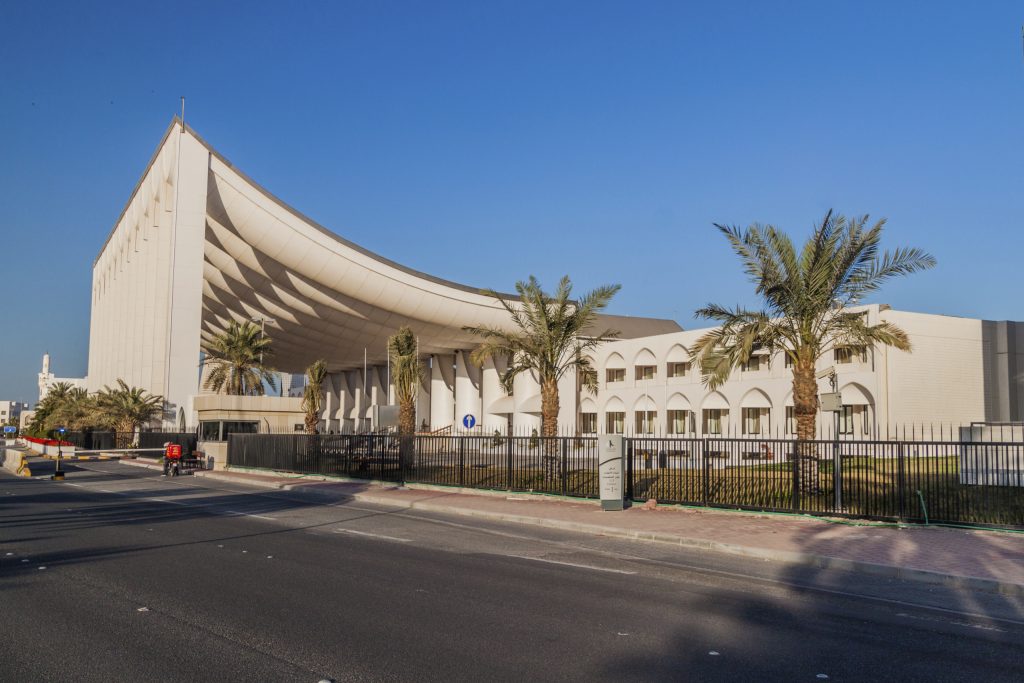Turbulence or Transformation: Is Kuwait likely to Restore Parliamentary Life?
As the War in Gaza rolled on, the world took only passing notice of another major event that took place in the Middle East this year: the suspension of parliament in Kuwait by the recently appointed Kuwaiti Emir, Sheikh Mishal al-Ahmed al-Sabah. To this day, the Kuwaiti parliament has not taken up its work again. However, to many observers in the region, this alarming status quo does not spell catastrophe just yet.
Last May, Emir Mishal Al-Ahmad Al-Jaber Al-Sabah suspended the parliament in Kuwait and seven articles from the constitution, triggering uncertainty about Kuwait’s democratic process, which is unique in the Gulf, as the parliament has real powers and challenges the government despite the executive authority’s control over state institutions. The articles of the constitution he suspended related primarily to the role of the National Assembly and to its oversight function, mainly because repeated quarrels between parliament and the government had hindered the enactment of laws and economic reforms. Even though this was a radical step and it might seem like the beginning of the end of parliamentary life in Kuwait, historical precedent indicates otherwise.
A close look at the political scene in Kuwait reveals the factors that guided the suspension of the country’s legislative body. Parliamentary life has been turbulent in Kuwait since 2003, as no parliament has completed its constitutional term, except for the one elected in 2016. During the same period, the parliament was dissolved on eight occasions before the end of the constitutional term, in addition to the recent suspension.
Moreover, the relationship between the legislative and executive authorities is imbalanced in Kuwait because the majority in the elected parliament does not form a government but rather coexists with a prime minister appointed by the Emir (semi-parliamentary system). This imbalance has led to repeated political deadlocks, especially in the Kuwaiti parliament, which comprises a contradictory combination of leftist, populist, and Islamist ideologies.
Economically, the ongoing trend in the Gulf toward economic diversification and transformation into commercial centers has left Kuwait behind. Despite being OPEC’s fifth-largest oil producer, Kuwait has not taken clear action in this regard – unlike its neighbors – and has suffered from significant problems, such as electricity outages in the summer, as a result. An IMF report issued in September 2023 interpreted Kuwait’s economic problems as “frequent changes of government, and the political impasse between government and parliament have impeded important fiscal and structural reforms.”
Political uncertainty: a way out?
In this complex context, the suspension of the parliament has thrown Kuwait’s semi-democracy into uncertainty with contradicting signs about the country’s trajectory.
In this regard, the initial Emir’s speech and subsequent Emiri order included a complex plan about the next steps, including forming an expert committee to draft constitutional amendment proposals within six months of its formation and then to submit them to the government for discussion. The process was supposed to end either by a public referendum or by sending the amendments to the next National Assembly for approval. However, the order did not clarify how an expert committee would be formed and set very broad goals governing the committee’s work: providing sound democratic governance and adhering to Islamic sharia.
Furthermore, in the absence of the parliament, the Emir issued decrees and formed a technocratic government in May, which underwent a quick change on August 25. The positive sign is that the new government witnessed an expansion of women’s participation, as women held three ministerial portfolios, the highest number in the country’s history. Nevertheless, the new government, acting without parliamentary oversight, failed to reveal its work program (until now) as the previous government used to. Therefore, pending issues, such as diversifying the economy, remain without clearly announced policies.
The long wait for results
It was striking that there were no protests in Kuwait after the parliament’s suspension, although the country repeatedly witnessed demonstrations motivated by political and social reasons, most notably in 2006, 2011, and 2019, which can be seen as a sign of popular consent for the decision after years of political deadlocks.
However, the popular silence should not be interpreted as a desire to abandon the democratic process altogether. Rather, it reflects a desire to reform the political system and address the defect that resulted from the existence of an elected parliament and an appointed prime minister, which complicated political and governmental work. After all, the high turnout in the recent parliamentary elections (62% in April 2024) reflects the Kuwaitis’ ongoing commitment to democracy.
A survey conducted after suspending parliament supports this conclusion. Most Kuwaitis (69%) believe that structural problems, especially the imbalance between the legislative and executive authorities, cause recurring deadlocks. Therefore, they blame the government and parliament together for crises, without placing responsibility on one institution alone. Nevertheless, the vast majority expressed support for parliamentary oversight of the government, elections, and the fact that democracy is the best system of governance.
So, despite – or perhaps exactly because – the fact that democratic freedoms have been rolled back over the past years according to the 2024 Bertelsmann Transformation Index (BTI), with freedom of expression falling from a high 7 out of 10 score to a low 3 and freedom of assembly ranking low throughout with a score of 4, Kuwaitis’ display a long-term commitment to democracy. This is also displayed by the fact that in recent months, public intellectuals and writers have repeatedly tried to stimulate public debate about amending the constitution and proposing democratic reforms, thereby keeping the democratic atmosphere alive.
Can democracy prevail?
Despite the difficult context and some negative signals during the past months, the parliament suspension will not ultimately undermine democratic transformation. However, history is likely to repeat itself for the third time, as happened in 1976 and 1986, for several factors; the Emir’s speech to dissolve parliament established a general rule governing the country’s future: adherence to democracy as a form of governance. The constitution also protects the democratically elected parliament and public freedoms and guarantees they will not be infringed upon (Articles 6 and 175).
Furthermore, Kuwait’s over 62 years of history have proven the deep-rootedness of parliamentary life and civil freedoms in the country, the commitment of the country’s various political ideologies to parliamentary life and the Kuwaitis’ defense of democracy, especially during previous periods of parliament’s suspension. Moreover, since the liberation from the Iraqi occupation in 1991, the parliament has become foundational to the legitimacy of the Kuwaiti political system.
Given the country’s need to break its dependence on oil and diversify its economy to emerge from its current stagnation, it will probably not risk any negative impact that the suspension of parliament will have on the markets. A recent paper on the impact of domestic unrest in Kuwait concluded that periods of parliament suspension hurt the markets and, consequently, the economy. Most importantly, however, the paper found that the importance of the parliament is rooted in popular consciousness due to its role in defending Kuwaitis’ social and economic rights and pressuring the government to improve social and economic benefits.
All these factors push towards the return of parliamentary life within four years at most, as stipulated in the Emiri decree. In other words, it is almost certain that the elected parliament will return to life, after the current period in which the Emir holds the executive and legislative powers with the assistance of the appointed government. However, ending the structural imbalance between the legislative and executive authorities and accelerating democratic transformation will always be subject to regional developments and popular pressure at home.
First published on Qantara.

